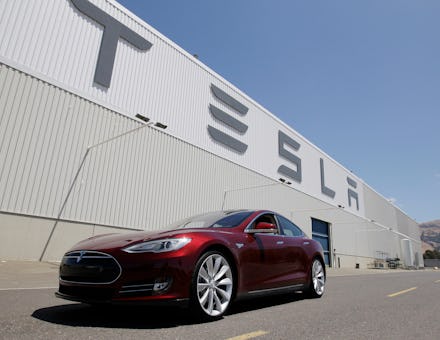Don't Ever Expect to See Electric Cars Replace Gas Cars in Your Lifetime

The news: If the Department of Energy's Energy Information Administration's (EIA) predictions are worth any salt, then it's a pretty bad outlook for environmentalists. A new report from the agency predicts that the vast majority of cars sold in 2040 — 27 years from now — will still be running on gasoline fuel; a total of 78% of light duty vehicles sold that year are likely to run on gas alone.
Even worse: just 1% of the other 22% of vehicles will be plug-in hybrids, 1% will be fully electric, and just 5% will be standard hybrid engines (think Prius).
There's a silver lining to this cloud of smog: dramatically increased fuel efficiency. The EIA forecasts that "micro hybrids" with energy-saving techniques already common in Europe like stop-start technology and regenerative braking. Along with generally improved engine design, cars produced in 2040 will get an average 37.5 mpg, as opposed to just 21.5 mpg in 2012.
What does this mean? If the EIA's forecast proves accurate, the progress the U.S. is making towards renewable energy sources isn't enough. (It also demonstrates that the U.S. will continie to lag behind European fuel standards.) Already in Norway, electric car usage is threatening to far outstrip infrastructural capacity due to various incentives such as bus lane access for electric vehicles and public charging stations.
Electric vehicles are still selling poorly, though they're now certifiably better for the environment than their gas-powered equivalents. The EIA predicts that auto manufacturers, which will continue to steer the market for cars, won't switch over to electric anytime soon. Even the cheapest electric vehicles still suffer from "range anxiety" — any trip of over 70-80 miles will likely require a stop for charging, usually overnight. Charging technology simply hasn't caught up.